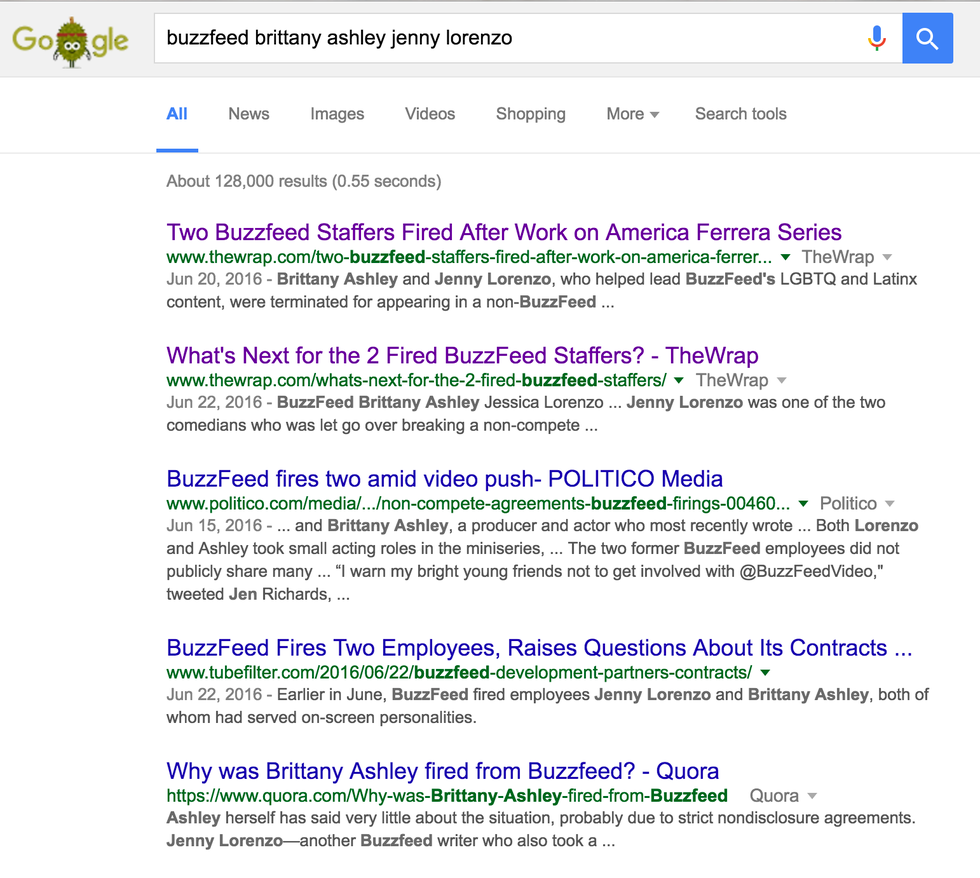Early this June, Buzzfeed terminated the contracts of two if its biggest content creators: Jenny Lorenzo and Brittany Ashley.
The liberal news and entertainment company publishes story articles, especially the increasingly popular listicle-style posts, but is perhaps better known for their YouTube presence. In addition to "Buzzfeed Video," the media company administrates a number of satellite channels such as "Buzzfeed Violet" (skits, short films) and "After Party" (an almost satirical version of Buzzfeed, self-described as “Buzzfeed Motion Picture’s drunk uncle”). Additionally, their "Pero Like" channel was launched in February, producing videos related to Latinx culture, especially concerning the intersectionality of growing up Latinx in the United States.
Jenny Lorenzo, one of the two employees fired in June, was already a familiar face in Buzzfeed videos before becoming a large contributor to "Pero Like." Brittany Ashley’s contributions include some of Buzzfeed’s most popular series, such as “You Do You.”
Both employees were terminated due to their involvement with “Gente-fied,” an upcoming web series produced by, and starring, America Ferrera. Contracts for working at Buzzfeed include a non-compete clause, and—by working on “Gente-fied” during their weekends--management decided, Lorenzo and Ashley violated their contracts.
RETRIEVED FROM GOOGLE 8/19/2016 4:58PM
The public reception, or rather, rejection of the news of Lorenzo and Ashley’s termination became news itself, as fans took to social media in disbelief and disagreement, including—ironically enough—the comment section of Buzzfeed YouTube videos. The news inspired articles as well as videos by internet personalities speaking out in support of their fellow creatives—can you say #meta?
In a statement released after the sh** hit the fan, the President of Buzzfeed Motion Pictures, Ze Frank, released a statement entitled, “Being A Part Of BuzzFeed Motion Pictures.” In this post, which does not explicitly mention the terminations, Frank explains that “the work you do while you’re on BuzzFeed’s staff belongs to BuzzFeed…you can’t work for other productions without our permission.”
From a business perspective, the non-compete clause is practical. Despite its popularity, the video production branch of Buzzfeed is less than five years old—practically infantile in the media business, so it makes sense that they want to protect their supply of content.
"As is standard across tech and media companies, BuzzFeed owns the work that you, our employees, create."
- Ze Frank, President of Buzzfeed Motion Pictures
The topic becomes more complex when you consider it from a creator’s point of view. Despite the ever-growing demand for digital media, jobs in the creative aspect of the entertainment industry aren’t plentiful—just ask any waiter/actor in any coffee shop in Los Angeles. Indeed, in an article published in December 2015, Gaby Dunn (half of the hilarious "Just Between Us" duo and another former Buzzfeed recognizable) painted a “painfully awkward” picture as she recounted Buzzfeed’s Golden Globes party. The dinner took place at a West Hollywood restaurant—where Brittany Ashley worked as a waitress to supplement her income from Buzzfeed.
The non-compete clause also means that series or characters produced by creatives while working at Buzzfeed, such as Brittany Ashley’s “Lesbian Princess,” which has amassed 5 million views, are the property of Buzzfeed Motion Pictures, and cannot be continued independently by the original creator if they leave or are fired from the company.
Buzzfeed’s business practicality argument grows shady when you consider the fact that the company “made more than $100 million in revenue in 2014” according to Inc., and was valued at $850 million. Additionally, a sizeable Community section produces much of the Buzzfeed News site content. Despite their apparent financial and hit count success, the multi millions of the company don’t appear to be trickling down to the people whose likenesses are the most recognizable commodity of the company.
Obviously, both Jenny Lorenzo and Brittany Ashley agreed to the terms of their contract when they joined the Buzzfeed team. Fans can only speculate as to whether the two knowingly broke their contract, or thought that because they worked on “Gente-fied” during the weekend, they were in the clear.
These terminations are important because they highlight the state of the creative side of the entertainment industry. As a young adult with limited options for working professionally in the creative field, how much influence do we think job candidates have to negotiate their contracts?
I watch Buzzfeed religiously. Upon discovering YouTube channels that not only discuss relevant news and pop culture in a timely and entertaining manner, but also explore intersectionality and give representation to minority, non-sample size, mental health, and LGBTQIA+ communities in the media? I fell in love, along with 9 million other subscribers, not just with the videos but the staff. Flash forward to this summer when I discovered that the average of the yearly salaries for the creative side of BFMP is around $42k. The disparity between the multimillion dollar company’s worth and its core creatives’ salaries is disappointing at the least, squicky at the worst, especially when you consider the fact that the creatives are largely members of marginalized populations. Exposure doesn’t pay the rent, even in LA.
Anyone else remember when Greek was abruptly off-air for a year due to writers going on strike for fairer wages? Eight years later, we’re seeing the same undervaluing of TV writers with today’s internet content creators. Creatives whose work has wracked up millions in views and dollars deserve more than $20/hr. In an age where instantaneous is the norm and imitation isn’t just flattery but de rigeur, original content is more valuable than ever. Buzzfeed Motion Picture’s success and rapid rise to relevance within four years illustrates that the people want diverse entertainment—we just also want the creatives responsible for the content we love to be fairly compensated.






















